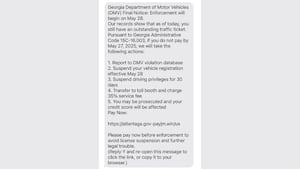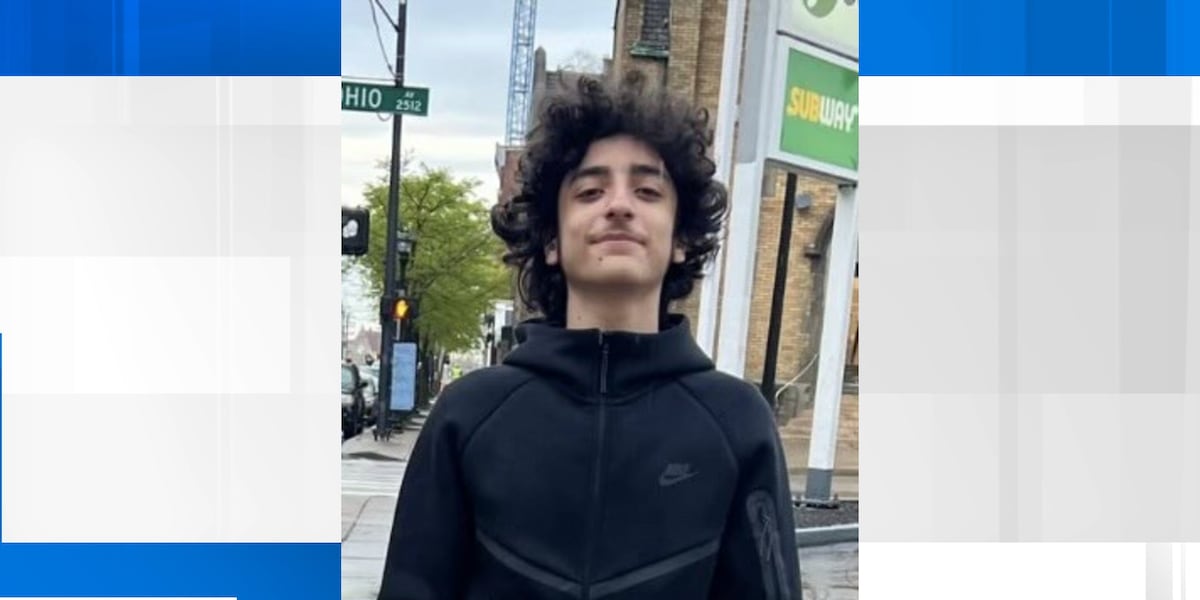Georgia DDS Scam Text: How To Identify And Report Phishing Attempts

Welcome to your ultimate source for breaking news, trending updates, and in-depth stories from around the world. Whether it's politics, technology, entertainment, sports, or lifestyle, we bring you real-time updates that keep you informed and ahead of the curve.
Our team works tirelessly to ensure you never miss a moment. From the latest developments in global events to the most talked-about topics on social media, our news platform is designed to deliver accurate and timely information, all in one place.
Stay in the know and join thousands of readers who trust us for reliable, up-to-date content. Explore our expertly curated articles and dive deeper into the stories that matter to you. Visit Best Website now and be part of the conversation. Don't miss out on the headlines that shape our world!
Table of Contents
Georgia DDS Scam Text: How to Identify and Report Phishing Attempts
Are you receiving suspicious text messages claiming to be from the Georgia Department of Driver Services (DDS)? You're not alone. A surge in phishing attempts targeting Georgians is underway, using fraudulent texts to steal personal information and financial data. This article will guide you on how to identify these scams, protect yourself, and report them to the appropriate authorities.
Understanding the Georgia DDS Phishing Scam
These scam texts often mimic official DDS communication, employing urgent language and alarming claims to pressure recipients into immediate action. Common tactics include:
- Threats of license suspension: Messages might falsely claim your driver's license is suspended or will be revoked unless you take immediate action, usually involving clicking a link or providing personal details.
- Fake renewal notices: Scammers may send texts pretending to be renewal reminders, urging you to update your information through a malicious link.
- Requests for personal information: The goal is to obtain your driver's license number, Social Security number, date of birth, and other sensitive data. Legitimate DDS communication will never request such information via text message.
- Urgent tone and pressure tactics: The messages are often designed to create a sense of panic, encouraging quick, impulsive responses without critical thinking.
How to Identify a Phishing Text from the Georgia DDS
Here's how to spot these fraudulent messages:
- Check the sender's number: Legitimate DDS communications won't come from random numbers. They might use official DDS numbers or short codes, but be cautious – scammers can spoof numbers.
- Look for grammatical errors and poor spelling: Official communications are usually well-written and error-free. Poor grammar and spelling are red flags.
- Don't click on links: Never click links in suspicious text messages. These links often lead to fake websites designed to steal your information.
- Hover over links (without clicking): On your computer, hover your mouse over the link to see the actual URL. If it looks suspicious or doesn't match the expected DDS website (dds.georgia.gov), avoid clicking.
- Contact the Georgia DDS directly: If you're unsure about a message's legitimacy, contact the Georgia DDS directly through their official website or phone number to verify. Never rely on the information provided in the suspicious text.
What to Do if You Receive a Suspicious Text
- Do not respond: Responding to these messages confirms your number is active, potentially leading to more scams.
- Report the text: Forward the suspicious text message to 7726 (SPAM). This helps your mobile carrier identify and block these numbers. You can also report it to the Federal Trade Commission (FTC) at reportfraud.ftc.gov.
- Report to the Georgia DDS: Contact the Georgia DDS through their official website to report the phishing attempt. This helps them track these scams and warn others.
- Monitor your accounts: Carefully monitor your bank accounts, credit reports, and other financial accounts for any unauthorized activity.
Protecting Yourself from Future Phishing Attempts
- Be cautious of unsolicited texts: Treat all unexpected messages with skepticism.
- Educate yourself: Stay informed about common phishing techniques and scams.
- Strengthen your passwords: Use strong, unique passwords for all your online accounts.
- Enable two-factor authentication (2FA): Adding an extra layer of security to your accounts significantly reduces the risk of unauthorized access.
By following these guidelines, you can effectively protect yourself from the Georgia DDS scam text and other phishing attempts. Remember, vigilance and critical thinking are your best defenses against online fraud. Stay safe and informed!

Thank you for visiting our website, your trusted source for the latest updates and in-depth coverage on Georgia DDS Scam Text: How To Identify And Report Phishing Attempts. We're committed to keeping you informed with timely and accurate information to meet your curiosity and needs.
If you have any questions, suggestions, or feedback, we'd love to hear from you. Your insights are valuable to us and help us improve to serve you better. Feel free to reach out through our contact page.
Don't forget to bookmark our website and check back regularly for the latest headlines and trending topics. See you next time, and thank you for being part of our growing community!
Featured Posts
-
 Long Lost Wwii Bomber Crash Victims Identified Four Airmen Coming Home
May 28, 2025
Long Lost Wwii Bomber Crash Victims Identified Four Airmen Coming Home
May 28, 2025 -
 Analyzing The French Open R1 Zverev Tien Mensik Muller Matchups
May 28, 2025
Analyzing The French Open R1 Zverev Tien Mensik Muller Matchups
May 28, 2025 -
 Major Investment Financial Avengers Holds Substantial Bank Of America Bac Stake
May 28, 2025
Major Investment Financial Avengers Holds Substantial Bank Of America Bac Stake
May 28, 2025 -
 Liverpool Fc Celebratory Parade Investigating The Disturbances
May 28, 2025
Liverpool Fc Celebratory Parade Investigating The Disturbances
May 28, 2025 -
 See Alexandra Daddarios See Through Gown At Diors Cruise Show
May 28, 2025
See Alexandra Daddarios See Through Gown At Diors Cruise Show
May 28, 2025
Latest Posts
-
 Major Glacier Collapse Engulfs Much Of Blatten Switzerland
May 30, 2025
Major Glacier Collapse Engulfs Much Of Blatten Switzerland
May 30, 2025 -
 Us Open 2025 Ticket Presale Controversy Fans Detail Allegations
May 30, 2025
Us Open 2025 Ticket Presale Controversy Fans Detail Allegations
May 30, 2025 -
 Endangered Missing Person Lexington Police Expand Search Efforts
May 30, 2025
Endangered Missing Person Lexington Police Expand Search Efforts
May 30, 2025 -
 Day 4 Recap Junior Alumnis Impressive Performances
May 30, 2025
Day 4 Recap Junior Alumnis Impressive Performances
May 30, 2025 -
 Early Heart Disease Risk Elevated By Cannabis Use New Research Shows
May 30, 2025
Early Heart Disease Risk Elevated By Cannabis Use New Research Shows
May 30, 2025
